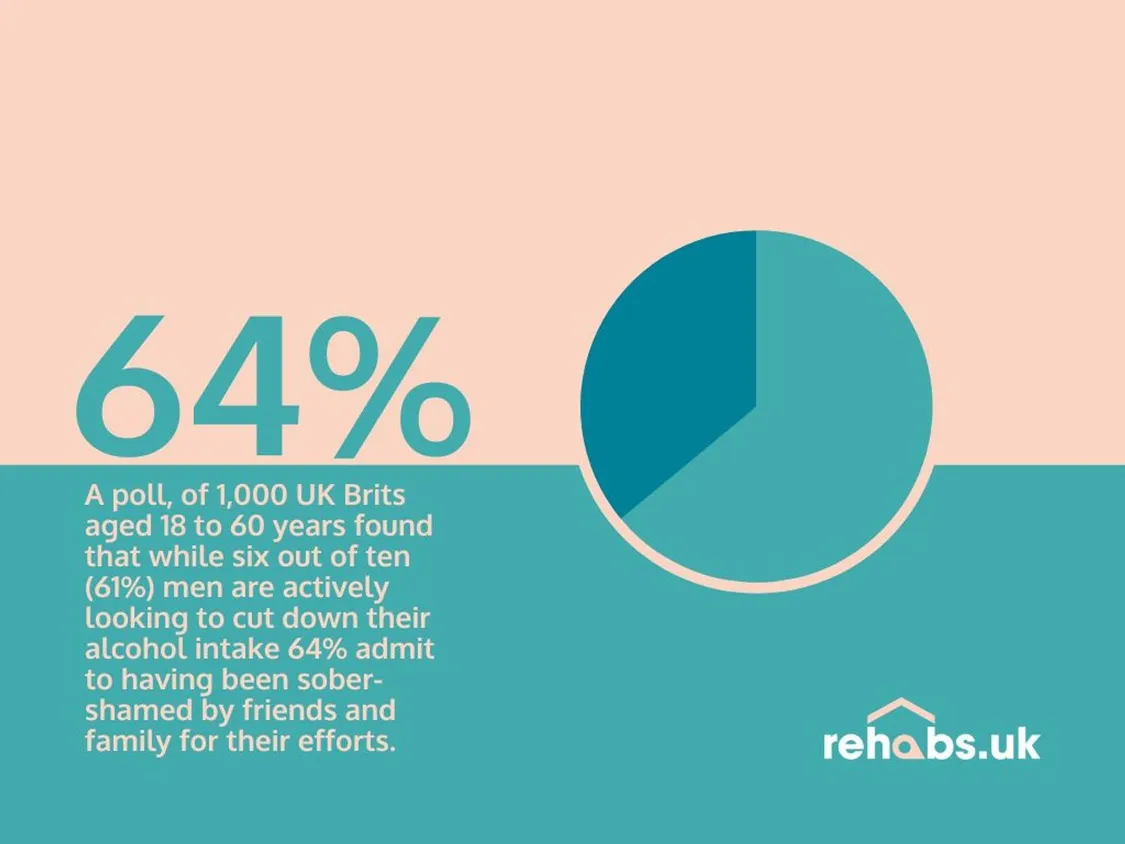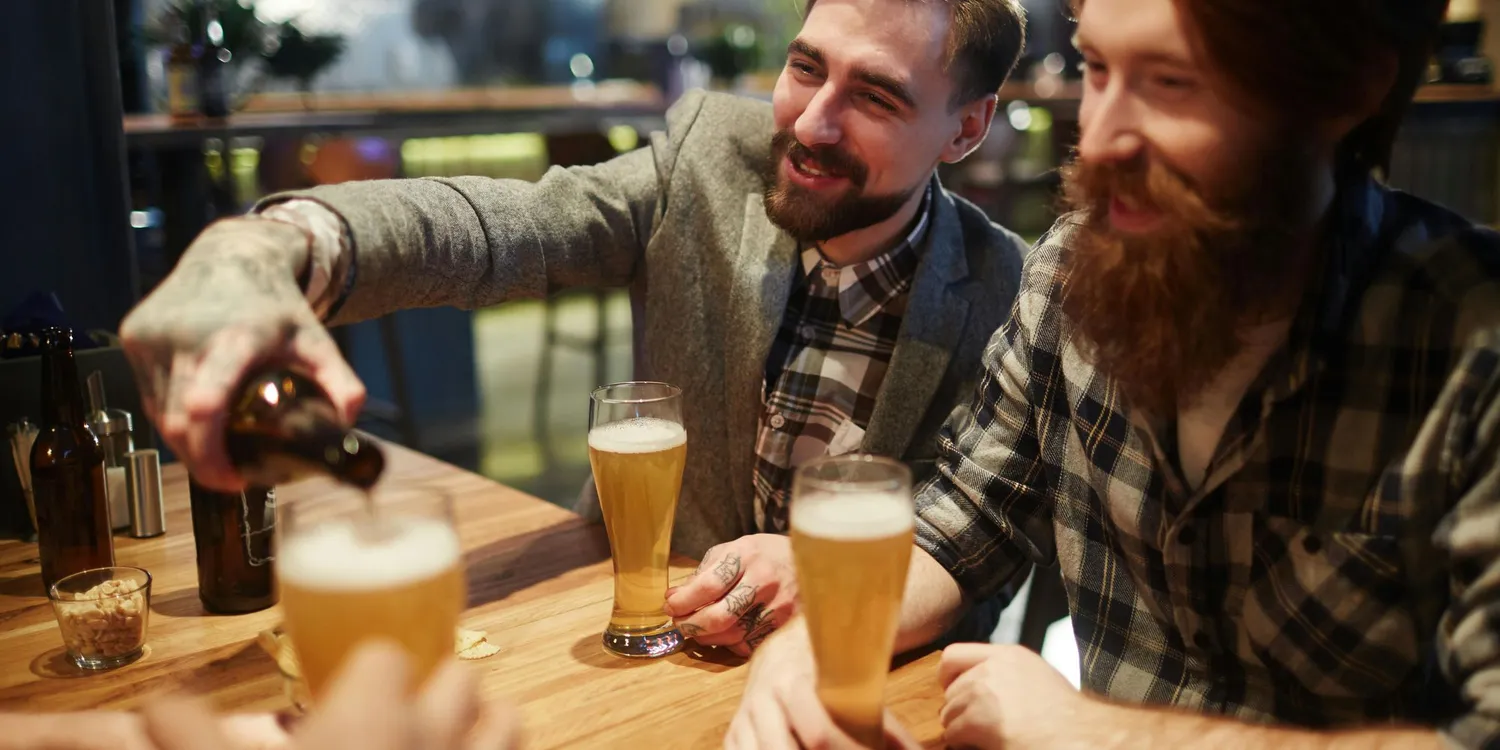20 Dec 2023
What is sober-shaming?
So, what is sober shaming? You might have heard the term popping up on social media recently but unsure of what it is. This is because it often goes unnoticed and people may not be aware of it. Sober shaming is when someone makes someone feel uncomfortable about not drinking.
64% of British men have been sober-shamed

“Many people – 5 million in the UK – have mild or moderate alcohol dependency,” says Richard Piper, chief executive of Alcohol Change.
A poll, of 1,000 UK Brits aged 18 to 60 years found that while six out of ten (61%) men are actively looking to cut down their alcohol intake 64% admit to having been sober-shamed by friends and family for their efforts. Considering we know how many millions of Brits have a dependency on alcohol, this percentage is concerning, especially when the majority of sober shaming appears to come from friends and family.
Societal reasons for sober-shaming
People often make others feel like they are being boring or that their decision not to drink is wrong. Sometimes people may not realise that they are ‘sober shaming’, they might think they are just having a joke. However, this can be really upsetting and damaging to some people, especially those people who may have struggled with their relationship with alcohol in the past.
The British drinking culture is very prominent and many people view drinking as a normal thing and that not drinking is ‘weird’ or not normal. Some things you might hear which can be classed as sober shaming are listed below:
- “It’s my birthday you have to have a drink”
- "It's Christmas, you can have one can't you?"
- “You only live once”
- “One drink won’t hurt you”
- “Don’t be boring”
You’ve probably heard people say these things when you’ve been out. For some, they might not mean anything but these phrases can possibly trigger someone if they do not practice relapse prevention. The pressure of having a drink can push someone into breaking their sobriety.
Some stay clear of temptation completely, as over 62% of men and 48% of women say they avoid the pub in the evenings and at weekends, to limit their chances of drinking alcohol.
Sometimes the drinkers who are sober shaming are actually hiding their own issues surrounding alcohol. This could be their own insecurity and why they may lash out at others who are sober. However, this isn’t always the case.
Why does sober shaming sometimes work?
If you are in recovery sober shaming could happen to you. The people you surround yourself with everyday probably drink regularly. For example, friends and family members. When trying to stay sober many people try to distance themselves from people who drink. However, that isn’t always possible or realistic. The temptation will be there. Some of these people may not support your recovery journey and therefore start to sober shame you. It is important to make sure you surround yourself with people who want to help and support you on recovery journey. If you can, try to limit time with negative people.
According to an article on Yahoo!Life, some unsupportive friends have even gone so far as to try and sabotage their mates' efforts, with 67% of men saying they've had alcoholic beverages bought for them at the bar, even after making it clear that they're not drinking.
With this in mind, it's no wonder some have kept their non-drinking preferences hidden, with 61% admitting they've ordered soft drinks at the bar and not told friends, for fear they'll be laughed at.
Data obtained by Alcohol Change UK, the charity that founded Dry January in this country back in 2013, found that in a survey of over 2,000 people 22 per cent of sober men feel uncomfortable in situations where everyone is drinking, compared to 16 per cent of sober women. Similarly, 18 per cent of sober men felt judged in situations with friends, compared to just 12 per cent of sober women.
Sober shaming doesn’t necessarily just come from family and friends, it can be from strangers too. It could be at the bar of a pub. You might order a non-alcoholic beer and get a funny look or a snide comment made. This can make you feel trapped and you might feel like everyone in the room is looking at you. You just need to remember that it isn’t true and don’t take the look or comment personally. Everyone has something going on in their life and you need to remember why you are on your recovery journey.
Why does sober shaming sometimes work?
Sober shaming can work. Vulnerable people are easy targets. When you feel a certain way, for example, humiliated or upset the feeling of shame has taken over. This type of psychological shaming has a massive impact on your mental health. Often when an individual starts to feel ashamed it can trigger more negative feelings. For example, feeling embarrassed, unappreciated or rejected. Some other ‘typical’ feelings are listed below:
- Sensitive
- Vulnerable
- Having no worth
- Feeling less than others around you
Taking into consideration the power that shaming can have on a person highlights why it is so important to talk about. If someone struggling is internalising all these feelings and emotions it can take a toll on their mental health and may push them to have a drink.
There is evidence which suggests that for someone who is newly sober, shaming can be very triggering as it activates a powerful protective response in the brain. This could mean that it might be easier for you to give into the shame and break your sobriety. Recovery is a life-long journey and over time you will be able to build up responses to being shamed.
Sober shaming could happen at any point in day-to-day life. However, there are some environments where this might be more prominent or noticeable.
For example,
- In a pub
- At a work event
- In a club
- At a music event
Alcohol Change UK, found that 1 in 5 people feel pressured to drink by their friends. That’s at least one person sitting around the pub table with you on a Friday night.
The best thing to do if you are in these environments is to check the venue and have a look at if they offer alcohol-free drinks. It may also be a good idea if you go with someone who is supportive of your sobriety or are sober themselves.
How to help someone who is in recovery deal with sober shaming?

Being supportive when out with friends or family who are in recovery and staying sober can help a lot. There are small steps you can take to make them feel more comfortable.
For example, if you hear someone sober shaming them or pressuring someone to drink, maybe step in and politely ask them to give some space. Just checking in on your friend if you hear anything being said which may trigger them. You could also join in by not drinking at that event as well.
It is also important that you should be aware of your own comments. You might not realise that you could have been sober shaming in the past.
Sober-shaming can be particularly harmful if someone is working through detox and alcohol withdrawal.
How rehab and treatment can help
If you are feeling overwhelmed, please reach out to these support networks and sponsors. These are great tools to help you combat your urges and to help you to maintain your sobriety.
Rehabilitation along with the treatments and therapies on offer provide you with the skills to fight back, whether via enrolment into a 12-step programme for addiction or rehab centre or clinic.
Throughout your treatment journey you will have built a support network, these are all people that you can speak to if you feel vulnerable to sober shaming. Support groups such as Alcoholics Anonymous (AA) are all great support networks to help you if you might be struggling.
Treatment creates a routine for you to live with. By practising this every day you can be the best version of yourself. Sobriety is nothing to be ashamed of, although it can be at times challenging and painful. It is important to remember why you are doing it and that other people don’t determine your happiness.
Don't do it alone
Sober shaming is something which people are now starting to address. If you are recovering from an alcohol addiction or you just want to live a sober life, you shouldn’t feel ashamed into breaking sobriety. Sober shaming needs to stop but there will almost always be occasions where it may happen. Just remember why you are choosing to be sober and that isn’t determined by someone who doesn’t have your best interests at heart.
#StopSoberShaming If you or a loved one are struggling with Alcohol, please do not hesitate to contact our specialist alcohol recovery team. They are here to answer any questions or concerns. We are here to help you.
Sober shaming FAQs - what people want to know
Does being sober make you a better person? That’s just one of the questions regularly asked by searchers according to Google data from AlsoAsked. Treatment Advisor Hannah Levi answers searchers’ most pressing questions about sober shaming.
What is sober shaming?
In essence, sober shaming is someone making anyone choosing not to drink feel uncomfortable about their decision. This can manifest in different ways, like pressuring someone to have a drink as it’s a special event, like Christmas or a birthday.
Why is being sober trending?
“With more and more celebrities and sober influencers sharing their stories via social media and advocating a healthier way of living I believe this is what is making being sober popular especially amongst young people.”
Are you happier when you don't drink?
“Personally, and as someone who has struggled with alcohol addiction, I would say I am much happier within myself. The 12-step programme has given me the tools not just to get through each day but to enjoy every moment and to be able to feel content and grateful for the life I have. I enjoy experiences a lot more and am able to form healthy relationships and help others who are in active addiction that would like to be in recovery. Alcohol is a depressant and can keep people isolated as well as increase mental health conditions. Therefore, cutting it out together can have a positive impact.”
Does being sober make you a better person?
“Being sober doesn’t necessarily mean that you will be a better person, however most people recognise that if they consume alcohol or use drugs, they may turn into Mr Hyde rather than being their usual Dr Jekyll persona. Alcohol and other substances are mind altering therefore they lower your inhibitions and can cause you to act in a way that is outside your normal behaviour. As someone in recovery I have embraced a spiritual programme that encourages personal development which means I am more self-aware and able to recognise my part in any wrongdoings.”
Can you go to the pub if you don't drink?
“You can certainly go to the pub if you don’t drink, however it is not advisable in early recovery because you are not likely to have built up a strong mental defence against alcohol and are likely to be very vulnerable to temptation. In the AA’s Big Book, it says “our rule is not to avoid a place where there is drinking, if we have a legitimate reason for being there”. It then goes on to say “therefore ask yourself on each occasion, do I have any good social, business, or personal reason for going to this place”. So always question your intentions first. Due to the increase of more people being interested in a sober lifestyle or mindful drinking many pubs recognise they have to be more inclusive and provide non-alcoholic alternatives.”
How do you politely tell someone you don't drink?
“Remember it is a personal choice and you do not need to explain why you do not drink. I would personally just keep it very simple and say “I don’t drink alcohol”.”
How do sober people socialise?
“For somebody new to sober socialising I would suggest doing an activity such as Bowling, Topgolf or ice-skating especially if you are someone who is anxious as it creates a talking point amongst the other people you are with. There are a variety of sober events ranging from raves to festivals and camp outs so there is plenty to do. Sobriety doesn’t mean that you can’t go out, socialise and have fun, the benefit is that you can remember it too.”
What you should never say to someone who is not drinking?
“Avoid asking why someone doesn’t drink because it’s important to remember it is a personal choice. There could also be other reasons why they do not consume alcohol which they may not want to share. If you offer someone an alcoholic drink and they decline, remember to be respectful as it’s their decision and do not pressure them into drinking.”
Is it rude to drink around sober friends?
“If somebody you are with is in early recovery it’s respectful to ask if they are ok with you consuming alcohol around them. As someone who has been in recovery for a while and has a strong programme, I have no issue with anyone drinking around me.”
If you or a loved one are struggling with Alcohol, please do not hesitate to contact our specialist alcohol recovery team. They are here to answer any questions or concerns. We are here to help you.
